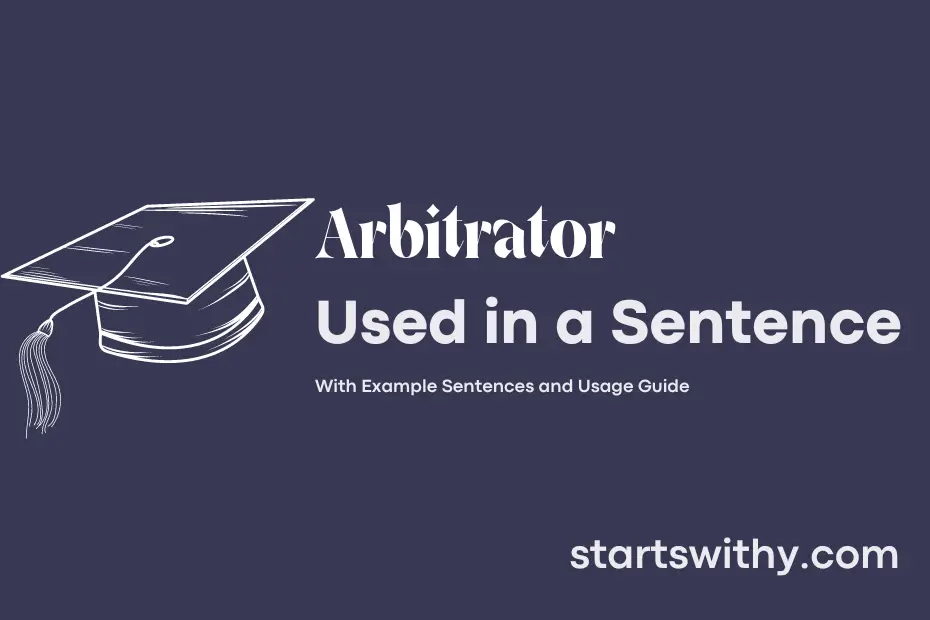Have you ever wondered who settles disagreements outside of court? Let’s talk about arbitrators. An arbitrator is a neutral third party who is appointed to hear both sides of a dispute and make a decision, usually binding, to resolve the conflict.
Arbitrators are often used in situations where parties want a quicker and more cost-effective resolution than going through the formal court system. Their decisions can be based on legal principles, industry standards, or their own judgment. So, next time you hear about arbitration, remember that arbitrators play a crucial role in providing a fair and efficient alternative to traditional litigation.
7 Examples Of Arbitrator Used In a Sentence For Kids
- The arbitrator helps solve problems.
- An arbitrator is like a judge.
- You can talk to the arbitrator if you need help.
- The arbitrator listens to both sides.
- The arbitrator makes fair decisions.
- You can trust the arbitrator to be fair.
- An arbitrator helps people get along.
14 Sentences with Arbitrator Examples
- The *arbitrator settled the dispute fairly between the college students regarding room allocations.*
- The arbitrator was called in to mediate between the two groups of students arguing over project credits.
- Students sought the help of an arbitrator to address the scheduling conflict for their exams.
- The college appointed an arbitrator to resolve the disagreement between the student council members.
- The arbitrator quickly came to a decision on the issue of plagiarism among the students.
- Students preferred to have an arbitrator resolve their conflicts rather than going through official channels.
- The college administration suggested hiring an arbitrator to handle the grievances of the student body.
- The student union decided to bring in an arbitrator to address the complaints about unfair grading practices.
- After failing to reach a compromise, the students agreed to let an arbitrator make a final decision for their group project.
- The arbitrator was known for his impartiality and ability to resolve disputes amicably among students.
- The college guidelines recommended using an arbitrator to handle disagreements between students and faculty.
- Despite initial hesitation, the students were relieved to have an arbitrator help them navigate their issues.
- The arbitrator was able to facilitate communication and understanding between the conflicting student organizations.
- College students recognized the importance of seeking the guidance of an arbitrator to resolve disputes peacefully on campus.
How To Use Arbitrator in Sentences?
To use an Arbitrator in a sentence, follow these steps:
-
Identify a dispute or disagreement that needs resolution.
-
Introduce the Arbitrator by stating their name or title in the sentence. For example, “According to the Arbitrator, the contract is binding.”
-
Clearly state the Arbitrator‘s decision or opinion in the sentence. For instance, “The Arbitrator ruled in favor of the tenant.”
-
Use the Arbitrator‘s decision as a reference point in the sentence to support your argument or clarify a point. For example, “As per the Arbitrator’s findings, the company is liable for damages.”
-
Ensure that the sentence contextually fits the discussion or conversation. Avoid using the Arbitrator‘s title unnecessarily.
By incorporating the Arbitrator into your sentence structure effectively, you can add credibility and authority to your claims or statements. Remember to provide context and clarity around the Arbitrator‘s role and decision in the sentence to convey your message clearly.
Conclusion
In conclusion, an arbitrator plays a critical role in resolving disputes objectively and impartially outside the traditional court system. These sentences with arbitrator demonstrate the importance of their role in facilitating fair and efficient dispute resolution processes. By considering the facts and arguments presented by both parties, an arbitrator can help reach a binding decision that is mutually acceptable and legally enforceable.
Ultimately, sentences with arbitrator underscore the significance of this neutral third party in ensuring that conflicts are addressed in a timely manner and with a focus on reaching a just outcome. Their expertise and neutrality are key factors in promoting trust and credibility in the arbitration process, making them an essential component of alternative dispute resolution mechanisms.



